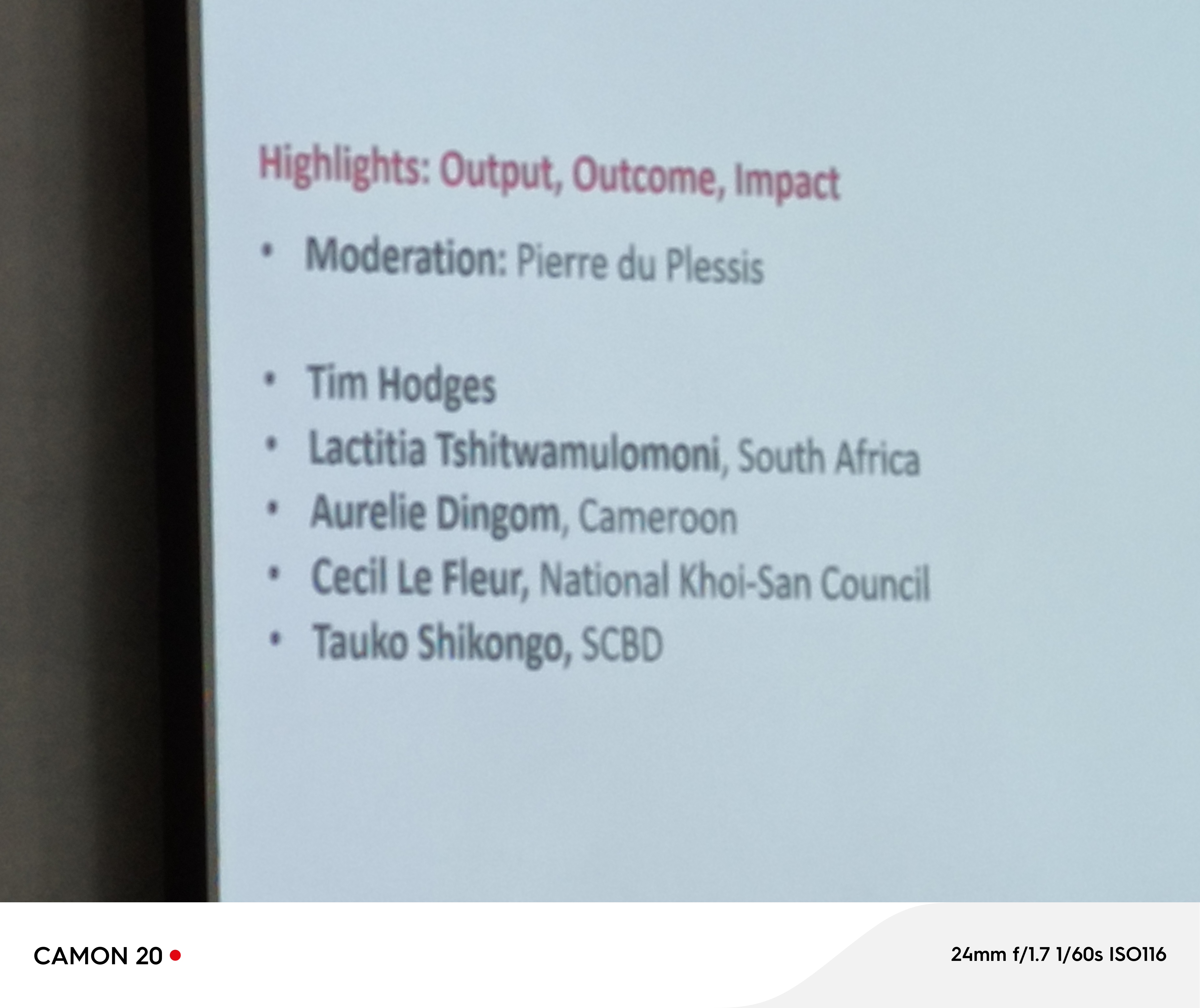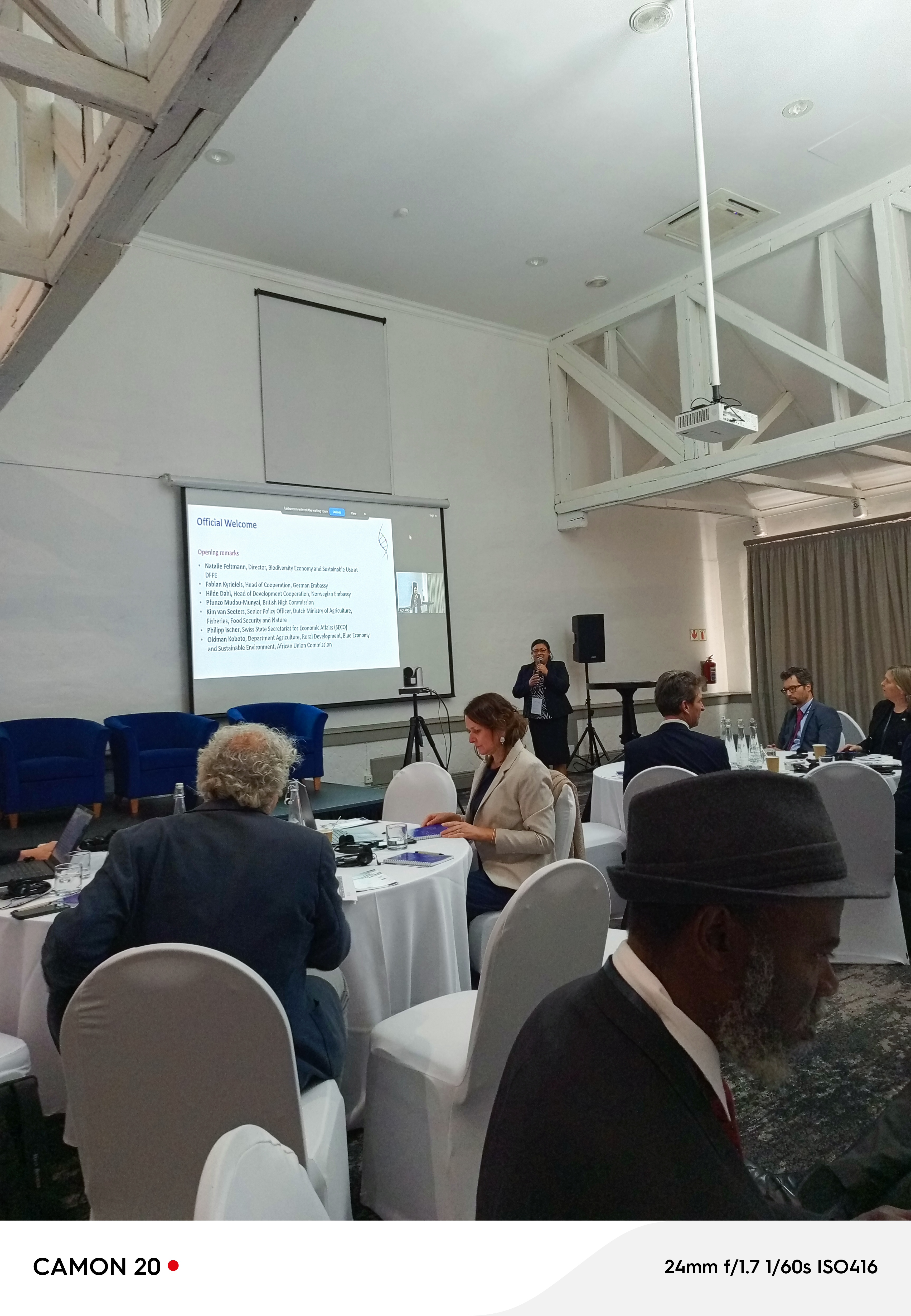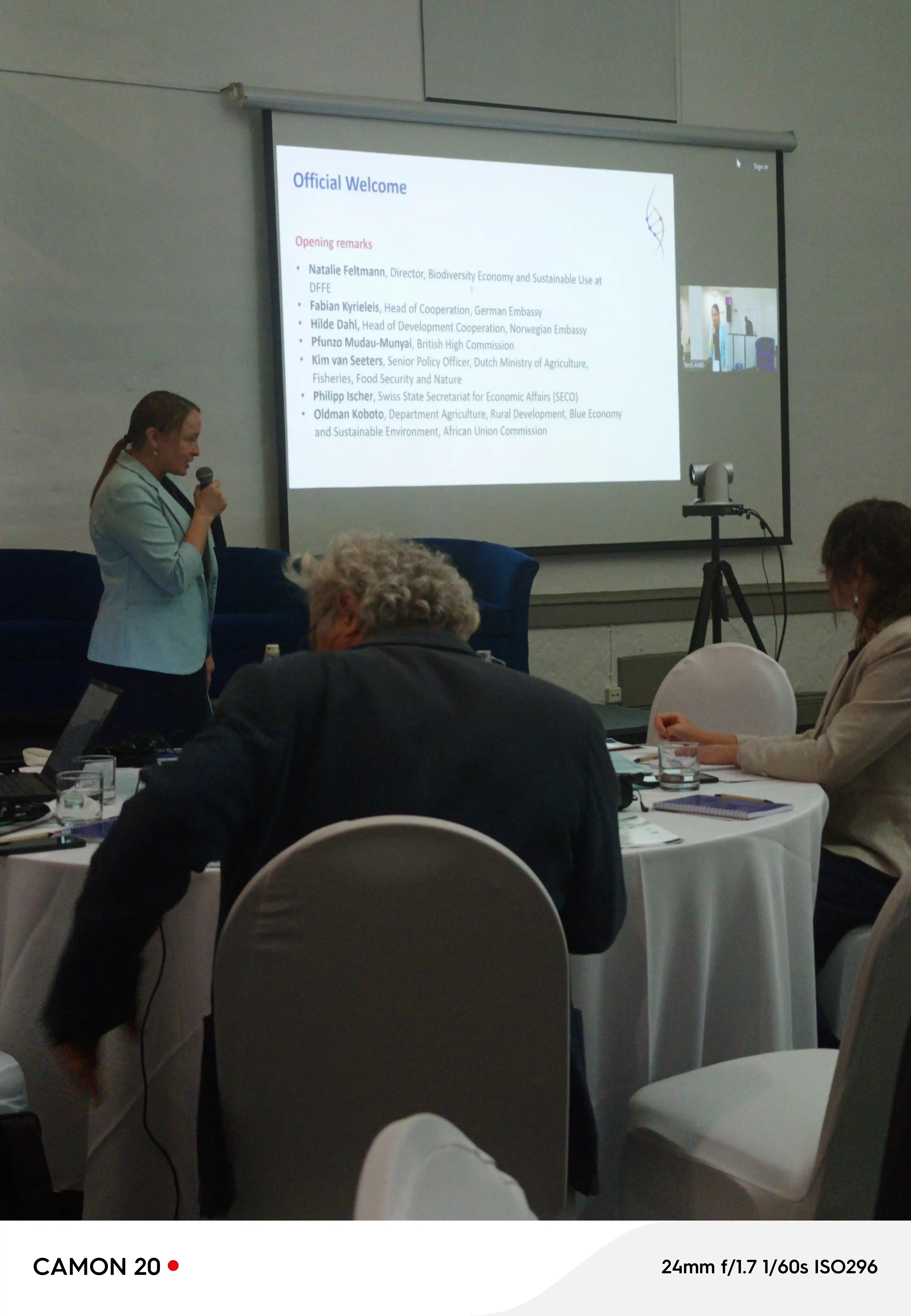News
Closing Event of the ABS Capacity Development Initiative – 17 September 2025, Johannesburg, South Africa
Highlights from the Opening Session

The Closing Event of the ABS Capacity Development Initiative opened with warm words of welcome to participants, celebrating the Initiative’s two-decade journey of strengthening Access and Benefit-Sharing (ABS) capacities across Africa and beyond. Speakers emphasized that while this marks the formal conclusion of the Initiative, it does not signify the end of ABS efforts. Instead, the knowledge, skills, and partnerships developed will continue to guide biodiversity governance and benefit-sharing processes in the years ahead.

Representatives of the donor community — including the Governments of Germany, Norway, the United Kingdom, and the African Union — reaffirmed their support for biodiversity conservation and ABS.
The German Embassy highlighted Germany’s long-term commitment to the Initiative and underscored that investing in biodiversity is investing in the planet’s future. Germany pledged to continue supporting international cooperation on biodiversity and benefit-sharing.
The Norwegian Embassy stressed the importance of Indigenous Peoples and Local Communities (IPLCs) in ABS processes, recognizing their central role in protecting biodiversity and traditional knowledge. Norway noted the Initiative’s success in promoting whole-of-government collaboration and thanked all partners for their dedication.
The British High Commission applauded the Initiative’s contribution to fostering innovation, strengthening cooperation, and producing valuable knowledge products. At the same time, it acknowledged the challenges of implementing ABS regulations, which in some countries can pose additional costs for stakeholders, leading to missed opportunities. The UK emphasized the need to address these challenges collectively to ensure ABS supports both conservation and sustainable economic growth.
The African Union emphasized Africa’s progress in developing ABS laws and frameworks, with support from the ABS Initiative and the Global Environment Facility (GEF). The AU underlined that ABS is a cornerstone for sustainable development, ensuring that biodiversity benefits are equitably shared.
Together, the opening remarks set a strong tone for the day, recognizing the Initiative’s impact while calling for sustained collaboration, stronger partnerships, and continued investment to advance ABS as a driver of equity, innovation, and biodiversity conservation.
Session 1 – 20 Years of the ABS Initiative
The first session reflected on the 20-year journey of the ABS Capacity Development Initiative, tracing its beginnings in 2006 through to its impact at national, regional, and global levels. Presenters and participants shared outputs, outcomes, and impact stories, highlighting how the Initiative has shaped the implementation of Access and Benefit-Sharing (ABS) across Africa and beyond.
A key milestone was the support to the domestication of the Nagoya Protocol, including the development of the African Union Guidelines on Nagoya Protocol domestication, which were formally adopted by AMCEN. These guidelines provided countries with a coherent framework for aligning national laws with international ABS obligations.
Another achievement was the development of ABS communication tools for Indigenous Peoples and Local Communities (IPLCs), produced in partnership with Natural Justice. These tools helped IPLCs understand their rights and engage more effectively in ABS negotiations.
The Initiative also supported business partnerships, capacity development, and value chain development, including innovative business models and valorisation approaches for genetic resources. These efforts not only advanced conservation but also generated livelihood opportunities.
The Initiative convened 13 Pan-African ABS Workshops, which became platforms for dialogue, peer learning, and capacity building. Notably, the workshop in Senegal broke new ground by welcoming the private sector to the table, fostering mutual understanding between resource providers and users.
Concrete examples of value chain development were presented, such as the exploitation of baobab as a biodiversity-based product, showcasing how communities and private actors can collaborate to create fair and equitable benefit-sharing mechanisms.
Overall, Session 1 celebrated the Initiative’s pioneering role in providing methodologies, processes, and networks that continue to strengthen ABS implementation across Africa.
Key Highlights from Thematic Workshops and Collaborative Initiatives
Beyond country-level interventions, the ABS Capacity Development Initiative has also played a critical role in convening and supporting thematic workshops and global dialogues to advance ABS and benefit-sharing.
One such event was the Mainstreaming ABS and Monitoring Benefit Sharing Workshop for National Focal Points (NFPs) held in Bonn in September 2024. This workshop strengthened the capacities of NFPs to design and implement monitoring systems for benefit-sharing, ensuring alignment with global reporting requirements.
In partnership with Biodiversity International, the Initiative advanced the mutually supportive implementation of the Plant Treaty and the Nagoya Protocol, helping countries manage the interface between agricultural genetic resources and broader ABS obligations.
Through the Darwin Initiative project, targeted support was extended to build institutional and community-level capacity, ensuring more inclusive and sustainable ABS processes.
The Initiative also contributed to global dialogues on Digital Sequence Information (DSI), including the outcomes of the Global DSI Retreat, where discussions laid the foundation for a multilateral DSI system. This work provided options and perspectives for how benefits derived from DSI can be shared fairly, ensuring that technological advances do not bypass the equity objectives of the Nagoya Protocol.
Together, these workshops and collaborative projects illustrate the Initiative’s commitment to building bridges—between treaties, institutions, communities, and emerging global policy discussions—ensuring that ABS remains a cornerstone of biodiversity governance.
Session 2 – Implementation of Capacity Development & Target 13
This session focused on the progress made in strengthening African countries’ capacity to implement the Nagoya Protocol, with particular emphasis on Target 13 of the Global Biodiversity Framework (GBF), which calls for a substantial increase in the fair and equitable sharing of benefits from the use of genetic resources and associated traditional knowledge by 2030.
A review of the 2025 ABS Clearing-House (ABS-CH) information for Africa showed that:
Out of 54 African countries, 49 are Parties to the Nagoya Protocol.
28 countries have registered at least one legislative, administrative, or policy measure.
11 countries have registered at least one ABS procedure.
8 countries have registered at least one Internationally Recognized Certificate of Compliance (IRCC).
Kenya leads in Africa with more than 130 IRCCs issued, highlighting its strong institutional capacity and functioning national ABS framework.
Key Considerations for Target 13
The need to increase the amount and diversity of benefits shared—both monetary (royalties, research funding, joint ventures) and non-monetary (capacity-building, technology transfer, joint publications, scholarships).
A call for clearer guidance on non-monetary benefits, which remain underreported yet are vital for IPLCs and sustainable development.
Recognition that ABS contributes not only to equity but also to biodiversity conservation and sustainable development, by creating tangible incentives for communities and governments to conserve biological resources.
The importance of adopting an ABS “whole-of-government” approach, ensuring that ministries of environment, agriculture, health, trade, and science work together, rather than treating ABS as a niche environmental issue.
Donor Perspective
Donor representatives expressed their strong commitment to supporting the implementation of Access and Benefit-Sharing (ABS) agreements and the broader objectives of the Kunming-Montreal Global Biodiversity Framework (GBF). They emphasized the importance of continued coordination of programs, capacity building, and the conservation of biodiversity, noting that benefit-sharing should become a “norm” integrated into the cost of doing business.
From the donor perspective, ABS is not only about compliance but also about supporting multiple facets of sustainability and the bioeconomy, including the implementation of National Biodiversity Strategies and Action Plans (NBSAPs). Donors underlined that with effective ABS systems, countries can advance conservation, sustainable development, and equitable growth simultaneously.
Special focus was given to the Global Biodiversity Framework Fund (Cali Fund), launched in February 2024. While its establishment was welcomed, donors acknowledged that it remains underfunded and stressed the urgent need for contributions so that the Fund can begin to deliver real impact. Several partners expressed readiness to further invest in the Cali Fund and the multilateral system, while also recognizing the importance of prioritizing resources, finding common ground, and maximizing synergies.
Specific interventions included:
Norad (Norway) highlighted its support for the multilateral system, awareness creation, and informal dialogue spaces (“the big room”) to strengthen IPLC participation. Norway also contributes to geospatial information systems, NBSAP reporting, and supports the NBSAP Accelerator Partnership and biodiversity finance planning. Importantly, Norway remains engaged as a “friend of the Cali Fund.”
Germany reaffirmed its commitment to support country-specific needs under the GBF, noting that “the job is not done.” Germany emphasized the need for further investment in the Cali Fund and maintaining momentum in supporting ABS processes across Africa and beyond.
Donors agreed that while resources are under pressure and budgets are shrinking, there is a clear appetite for more collaboration. They stressed that moving forward requires building synergies, strengthening donor coordination (including possible donor committees), and ensuring that investment priorities are aligned with the sustainability agenda.
In closing, donors expressed optimism that the legacy of the ABS Capacity Development Initiative can be carried forward, provided that funding, partnerships, and political will converge to make ABS a driver of conservation, sustainable use, and equitable benefit-sharing.


